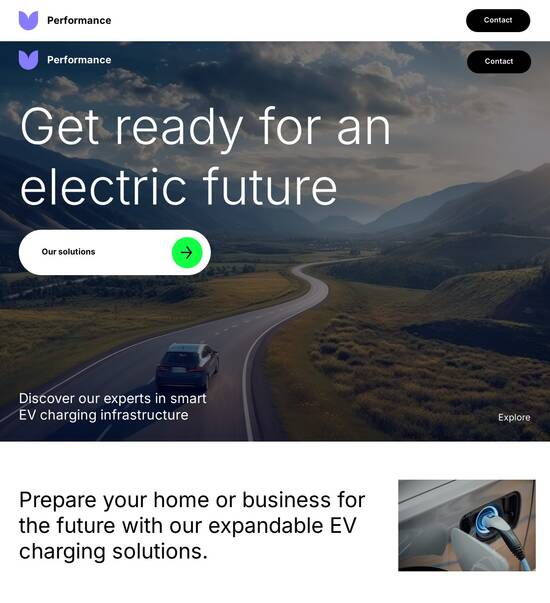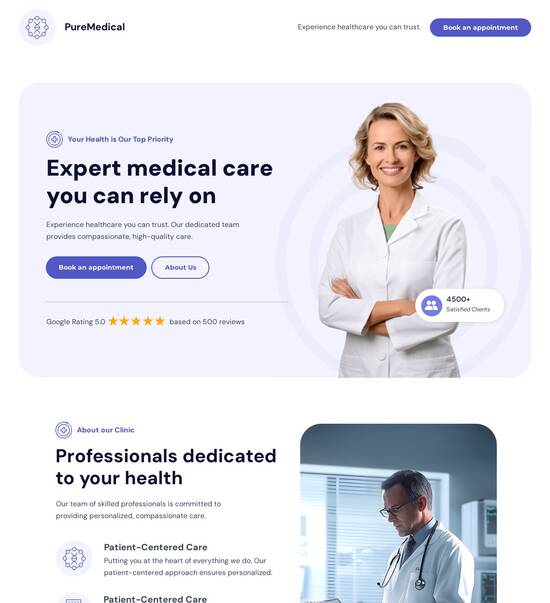
Sales funnel page template compatible with Shopify
Explore Similar TemplatesAbout template
Build and integrate high-converting sales funnel page templates with Shopify effortlessly!
Recommended templates

Easy to build without coding
With the intuitive drag-and-drop builder, anyone on your team can create high-converting pages without any knowledge of code or design. Make enhancements to your landing page with custom widgets using Javascript, HTML/CSS, or third-party scripts.

Multiple layouts for any industry and goal
Select from 500+ landing page layouts built to boost conversions across industry-specific scenarios. Customize them by adjusting fonts, adding images, and generating on-brand content with the AI assistant. Quickly scale with Instablocks® and Global Blocks that you can save, reuse, and update globally.

Loads fast and looks polished on any device
Every template is responsive, which means they present professionally on any device and load blazingly fast with our Thor Render Engine. You can also power them up with Google AMP technology to deliver an unparalleled mobile experience and drive higher conversions.

Robust analytics & experimentation
Get real-time updates and reporting across all your devices, showing the number of visitors, conversions, cost-per-visitor, and cost-per-lead. Launch AI-powered experiments, run A/B tests, and use heatmaps to analyze user behavior, then optimize your landing page to maximize conversions.







Easy to build without coding
With the intuitive drag-and-drop builder, anyone on your team can create high-converting pages without any knowledge of code or design. Make enhancements to your landing page with custom widgets using Javascript, HTML/CSS, or third-party scripts.
Multiple layouts for any industry and goal
Select from 500+ landing page layouts built to boost conversions across industry-specific scenarios. Customize them by adjusting fonts, adding images, and generating on-brand content with the AI assistant. Quickly scale with Instablocks® and Global Blocks that you can save, reuse, and update globally.
Loads fast and looks polished on any device
Every template is responsive, which means they present professionally on any device and load blazingly fast with our Thor Render Engine.
Robust analytics & experimentation
Get real-time updates and reporting across all your devices, showing the number of visitors, conversions, cost-per-visitor, and cost-per-lead. Launch AI-powered experiments, run A/B tests, and use heatmaps to analyze user behavior, then optimize your landing page to maximize conversions.
All the features you need to build sales funnel for shopify
Explore more featuresLearn how to build shopify funnel template
Frequently asked questions about sales funnel on shopify
Leading the way in building high-performing landing pages





Create a sales funnel on shopify: Your ultimate how-to guide
In today's competitive digital landscape, utilizing a powerful landing page and conversion rate optimization (CRO) platform like Instapage can significantly enhance your marketing efforts. With over 100 customizable templates and lead generation elements at your disposal, you can quickly create high-converting pages tailored to your audience's needs. This guide will walk you through the essential steps of setting up effective landing pages using Instapage, optimizing them for maximum engagement, and understanding key features that make Instapage the preferred choice for marketers across various industries.
Understanding the importance of landing pages
Landing pages serve as the frontline of your digital marketing campaigns. They are designed to convert visitors into leads by capturing information or driving sales. A well-crafted landing page can amplify your marketing efforts significantly. By focusing on the right elements, you can create pages that not only attract traffic but also convert visitors effectively.
- Alignment with marketing goals - Each landing page should cater to a specific campaign objective.
- A/B testing capabilities - Regular testing of elements like headlines and buttons helps refine your approach.
- Responsive design - Ensures your landing pages perform well on any device, enhancing user experience.
Step 1: Selecting the right template
Instapage offers a wide variety of templates designed for multiple industries. To create a compelling landing page, start by choosing a template that aligns with your campaign goals.
- Identify your target audience - Understand who you are crafting the landing page for.
- Utilize pre-built components - Access various elements ready for use, minimizing setup time.
- Consider layout options - Choose layouts optimized for specific types of content or calls to action.
Step 2: Customize your landing page
Once you have selected a template, customization comes next. This step allows you to tailor the page more closely to your brand and campaign specifics.
- Incorporate brand elements - Use logos, colors, and fonts consistent with your brand identity.
- Tailor messaging - Ensure the copy resonates with your audience, addressing their needs and pain points.
- Implement dynamic text replacement - Personalize content based on the source of traffic, improving relevance.
Step 3: Optimize and publish your page
After customizing your landing page, utilize Instapage’s built-in optimization features to ensure it performs at its best.
- Heatmaps for user behavior analysis - Understand how visitors interact with your page.
- Implement calls to action - Strategic placements of buttons will guide users toward desired actions.
- Leverage analytics dashboard - Track conversions, traffic sources, and overall performance metrics.
By adhering to these steps, you can effectively harness the capabilities of Instapage to create high-converting landing pages designed specifically for your target audience, maximizing your return on investment within your digital marketing campaigns.
Ready to elevate your marketing strategy? Explore Instapage and see how easy it is to create landing pages that convert. Start your free trial today!
People also ask about shopify sales funnel optimization
Sales funnel page template compatible with Shopify
Understanding sales funnels in the e-commerce landscape
The concept of sales funnels is essential in e-commerce, guiding potential customers from the awareness stage to the final purchase. A sales funnel outlines the journey a consumer takes, representing various stages from initial contact to conversion. The greater the understanding of each funnel stage, the more effectively businesses can target their marketing strategies.
In e-commerce, sales funnels can improve conversion rates significantly. They allow businesses to segment their audience and tailor content and offers according to the stage of the journey the consumer is in, leading to heightened engagement and, ultimately, sales.
Essential features of sales funnel page templates for Shopify
A robust sales funnel page template designed for Shopify should possess specific features to meet the needs of e-commerce businesses. User-friendly design elements are critical for facilitating the quick integration and utilization of the template. Customization options and a simple drag-and-drop interface make creating tailored landing pages effortless, allowing marketers to experiment with different layouts.
Furthermore, mobile-responsive design capabilities are non-negotiable. As mobile shopping continues to increase, having a template that adjusts seamlessly to various screen sizes ensures a consistent user experience across devices. This is vital for capturing those on-the-go shoppers who can be converted at any moment.
Customization options for personal branding.
Drag-and-drop interface for ease of use.
Mobile responsiveness to cater to all users.
The role of Shopify-compatible sales funnel templates
Shopify-compatible sales funnel templates allow for seamless integration with existing Shopify stores. This is crucial for business owners who often find themselves juggling multiple platforms. With such templates, data syncs effortlessly across the systems, ensuring that monitoring traffic and conversions remains straightforward.
Case studies exemplifying successful implementations show that e-commerce brands leveraging these templates see significant increases in conversion rates. A well-structured funnel, combined with the unique functionalities offered by Shopify, enables marketers to craft comprehensive strategies tailored to their specific audiences.
The funnel reporting dashboard: unlocking data insights
A funnel reporting dashboard is a powerful tool for any marketer, serving to visualize the effectiveness of their sales strategies. By providing real-time data and metrics, it enables users to assess where they stand regarding their sales goals. The dashboard tracks essential indicators like click-through rates, conversion rates, and drop-off points.
Furthermore, the visual representation of data helps in interpreting trends and making informed decisions swiftly. This fortifies the argument for a system where marketers can glance at their performance and adjust strategies accordingly.
Features of sales funnel reporting templates
High-quality sales funnel reporting templates exhibit customizable reporting metrics. Businesses can track essential performance indicators like conversion rates, website traffic, and user engagement levels. Tailoring these metrics based on specific business needs allows for a more granular understanding of what drives conversions.
Additionally, stage-specific insights are vital for comprehending customer behavior throughout the funnel. From the initial awareness phase to the final purchase, gaining clarity on how customers interact at each stage proves invaluable for refining marketing strategies.
Customizable metrics for targeted insights.
Detailed analysis of each customer journey stage.
Visual representations simplifying data comprehension.
Integrating reporting dashboards for enhanced decision-making
The integration of a comprehensive sales funnel reporting system provides a plethora of benefits. Real-time data updates ensure that businesses stay ahead of trends and quickly adapt strategies. The ability to see up-to-the-minute metrics can significantly influence marketing campaigns.
Data-driven improvements become a standard practice when businesses actively identify bottlenecks within the cells of their sales funnel. Knowing where leads tend to drop off enables marketers to refine messages and adjust the customer experience accordingly.
Connecting data to customer profiles
Analyzing customer behavior through sales funnel reports provides valuable insights into who your customers are. By using reporting data to segment audiences based on their interactions within the funnel, marketers can deliver targeted communications that increase engagement and sales.
The impact of considering customer data extends to future sales strategies, allowing brands to personalize experiences tailored to specific market segments. This level of customization builds stronger relationships and fosters loyalty.
Crafting an effective reporting template
A high-quality reporting template should incorporate detailed data visualization, enabling users to pinpoint trends and performance metrics. Charts, graphs, and heatmaps can succinctly present complex data, making it easy for stakeholders to grasp crucial insights.
In today’s fast-paced environment, automated reporting features are indispensable. Automation saves time, ensures regular updates, and allows users to integrate this reporting seamlessly with other marketing tools, promoting a streamlined workflow.
Best practices for utilizing sales funnel reports
Establishing a regular analysis schedule ensures that reporting becomes a part of your routine. By frequently evaluating data, marketers can uncover trends and opportunities for growth that otherwise might go unnoticed.
Moreover, comparing past reports reveals changes over time, providing insight into what strategies resonate with consumers. Effectively sharing these reports across teams enhances collaboration and ensures everyone is aligned towards common goals.
Understanding customer behavior through funnel reporting
Tracking lead behavior at each funnel stage is crucial for nurturing potential customers. Techniques like lead scoring help assess the likelihood of conversion based on the engagement a lead has displayed throughout the funnel.
Real-world applications of sales funnel reporting showcase brands successfully employing targeted optimization strategies. By leveraging data from reports, companies can tailor marketing campaigns, leading to more effective outreach and higher conversion rates.
Maximizing conversion rates through optimization strategies
Implementing A/B testing of different funnel elements can provide insights into what design or message works best. Testing various page designs and content can lead to significant improvements in how leads interact with your sales funnel, thereby increasing conversions.
Refining customer engagement strategies based on insights from your reports will enhance the user experience. By understanding behavioral data, businesses can create content that speaks directly to consumer needs and preferences.
Future trends in sales funnel optimization
The evolution of sales funnels in e-commerce will likely incorporate AI and machine learning to provide even deeper insights and predictions. Predictive analytics tools will empower businesses to forecast customer behavior accurately and refine their funnel strategies effectively.
Emerging technologies will revolutionize how businesses interpret data from their sales funnels, making it easier to streamline processes, enhance user engagement, and ultimately drive higher conversion rates.
Creating a comprehensive sales funnel strategy for your Shopify store
A successful sales funnel plan requires a thorough analysis of the target audience. Understanding customer preferences, behaviors, and pain points allows for the development of tailored customer journeys that align with their needs.
Continuous feedback and adjustments are integral to this process. By regularly reviewing performance metrics, businesses can pivot their strategies to meet changing demands and preferences effectively.
Measuring success in your sales funnel implementations
To evaluate the effectiveness of sales funnel implementations, businesses should establish key performance indicators (KPIs) that track essential metrics such as conversion rates, customer retention, and overall customer satisfaction. This quantitative approach enables brands to identify which aspects of their funnel strategies need refinement.
Strategies should focus on ongoing data analysis to uncover insights and opportunities for improvement. Regularly updating these KPIs ensures that the sales funnel remains responsive to market demands, enhancing overall effectiveness.
Integrating sales funnel reporting into a holistic marketing strategy
The intersection of sales funnels and overall marketing campaigns is crucial for maximizing brand visibility and conversion rates. Cohesion between sales funnels, content marketing, and social media strategies creates a unified framework that guides potential customers seamlessly through the purchasing process.
Cross-channel reporting plays an essential role in these efforts. By analyzing metrics across different channels, marketers can identify how to best engage their audience, ensuring that marketing efforts support sales funnel objectives.
Ready to skyrocket conversions?
Supercharge your ad campaigns with high-performing landing pages
Get started














